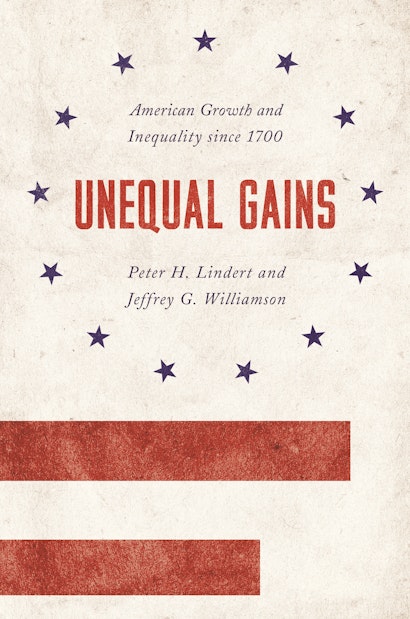Unequal Gains offers a radically new understanding of the economic evolution of the United States, providing a complete picture of the uneven progress of America from colonial times to today.
While other economic historians base their accounts on American wealth, Peter Lindert and Jeffrey Williamson focus instead on income—and the result is a bold reassessment of the American economic experience. America has been exceptional in its rising inequality after an egalitarian start, but not in its long-run growth.
America had already achieved world income leadership by 1700, not just in the twentieth century as is commonly thought. Long before independence, American colonists enjoyed higher living standards than Britain—and America’s income advantage today is no greater than it was three hundred years ago. But that advantage was lost during the Revolution, lost again during the Civil War, and lost a third time during the Great Depression, though it was regained after each crisis. In addition, Lindert and Williamson show how income inequality among Americans rose steeply in two great waves—from 1774 to 1860 and from the 1970s to today—rising more than in any other wealthy nation in the world. Unequal Gains also demonstrates how the widening income gaps have always touched every social group, from the richest to the poorest. The book sheds critical light on the forces that shaped American income history, and situates that history in a broad global context.
Economic writing at its most stimulating, Unequal Gains provides a vitally needed perspective on who has benefited most from American growth, and why.
"[I]ts conclusions are both accessible and urgent."—Kirkus Reviews
"Brilliant. . . . A masterpiece in quantitative and qualitative economic research destined to become a classic in its field."—Library Journal
"An ambitious and rigorous attempt to address some long-overlooked questions about U.S. economic development."—Helen Fessenden, Econ Focus
"[Unequal Gains] traces how inequality surged and receded in American history. . . . The book contains an unprecedented graph that goes all the way back to the eve of independence and charts how unequal people's incomes were. . . . This is as much a work of history as it is a work of economics."—Washington Post
"Stunning."—Kenneth Stewart and Casey Jones, Standard-Times
"Unequal Gains provides a brilliant historical perspective on the market forces and political currents behind the explosion of economic disparities in the United States over the past four decades. Lindert and Williamson offer essential insights that can help assure a more equal sharing of the gains made possible by American economic growth."—Samuel Bowles, author of The Moral Economy: Why Good Incentives Are No Substitute for Good Citizens
"Unequal Gains is a very important contribution to the study of American economic development, and is particularly relevant for current concerns about the causes and consequences of income inequality. Lindert and Williamson provide new information about the qualitative and quantitative changes since the colonial period, mainly in the United States, but also in comparison with Great Britain and other nations. This is a major scholarly achievement."—Stanley L. Engerman, University of Rochester
"Unequal Gains is a provocative book that forces us to change the ways we think, write, and teach about American and global economic history. Lindert and Williamson find that Americans have almost always had the world's highest incomes, that the United States may have been the first nation to achieve modern economic growth, and that economic inequality is less a price we pay for progress than a matter of policy choices."—Richard Sylla, New York University
"In this magisterial book, Lindert and Williamson review and reestimate American economic growth and income distribution from before independence to today. The reader follows the growth of the American economy from its modest beginnings to its almost unchallenged global supremacy—but also its many distributional struggles. An indispensable and most pleasurable read."—Branko Milanovic, author of Worlds Apart: Measuring International and Global Inequality
"What are the relationships among inequality, capitalism, and economic growth in the United States? In Unequal Gains, the two greatest scholars of inequality in the longue durée revisit the data and the arguments and bathe the twentieth-century evidence in historical context."—James A. Robinson, University of Chicago
"This book, written by two of today's most distinguished economic historians, is one of the most impressive and important I have read in recent years. Unequal Gains is a landmark study that contributes in a substantive way to contemporary policy debates."—Peter A. Coclanis, author of The Shadow of a Dream: Economic Life and Death in the South Carolina Low Country, 1670–1920
"There is growing academic and policy concern about rising inequality in America, and this timely and engagingly written book has the potential to play an important role in those debates."—Jeremy Atack, coauthor of A New Economic View of American History


